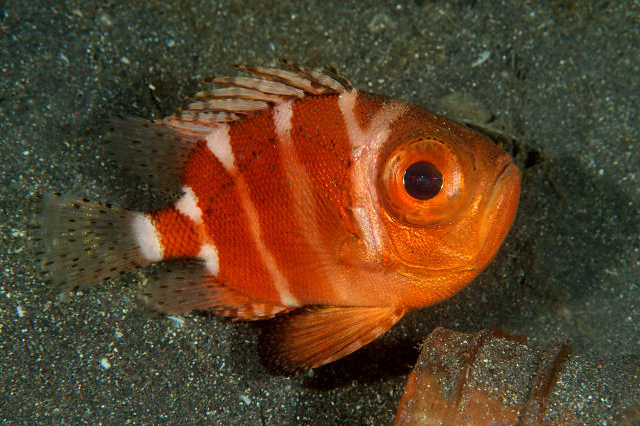Whiteband Bigeye, Pristigenys niphonia (Cuvier 1829)

A Whiteband Bigeye, Pristigenys niphonia, at Osezaki, on the Izu Peninsula, Japan, depth 33 m. Source: Izuzuki / http://www.izuzuki.com/. License: CC BY Attribution-ShareAlike
Video of a Wideband Bigeye at Wakayama, Japan, depth 8-12 m.
Video of a Whiteband Bigeye (aka Japanese Bigeye) in Japan.
Another Whiteband Bigeye in Japan.
Whiteband Bigeye, Pristigenys niphonia (Cuvier 1829)
More Info
|
Distribution |
Off North West Cape, Western Australia, to off Newcastle, New South Wales. The species occurs elsewhere in the tropical western Pacific from southern Japan to northern Australia and east to Samoa. Occurs on deeper offshore rocky reefs and trawl grounds. Adults inhabit deep reefs, while juveniles prefer shallower waters. |
|
Features |
Dorsal fin X, 11; Anal fin III, 10; Gill rakers (first arch) 7-10 + 19-22 = 27-31; Lateral-line scales 31-39; Vertebrae 23. Body scales above pectoral fin with about 11-60 spinules on posterior margin, the number increasing with growth; caudal fin generally rounded in young, becoming somewhat double emarginate in adults (noticeable in specimens over 15.0 cm SL). |
|
Colour |
Overall dark red to reddish-orange, with five distinct white or pale bars on body about 1/2-3/5 width of pupil expanded ventrally and dorsally with latter angled posterodorsally (very distinct in young, less obvious in adults) becoming narrower with growth; pelvic fin tips dusky to black; dorsal spines and anterior half of fin membranes reddish-pink or pale pink; soft dorsal and anal fins with dusky to black margins; and pale submarginal bands in adults and subadults; pectoral fins reddish to pinkish; iris reddish to silvery. The species lacks a black margin on the posterior soft portions of the vertical fins. |
|
Feeding |
absence of black margins on posterior soft portions of vertical fins; 5 white or pale vertical bands (often indistinct) on body about 1/2-3/5 width of pupil expanded ventrally and dorsally with latter angled posterodorsally, very notable in young, less obvious in adults |
|
Fisheries |
May be taken as bycatch in trawl fisheries. Juveniles are also seen in the aquarium industry, especially in Japan. |
|
Etymology |
The specific name is from Niphon (now Nippon or Nihon = Japan), as the species was described from Nagasaki, Japan. |
|
Species Citation |
Priacanthus niphonius Cuvier, 1829, Histoire Naturelle des Poissons 3: 107. Type locality: Neotype, southwestern region of Nagasaki Bay, Kyushu Island, Japan, 31°55'N, 128°11'E. (original type locality Japan) |
|
Author |
Bray, D.J. 2025 |
|
Resources |
Whiteband Bigeye, Pristigenys niphonia (Cuvier 1829)
References
Allen, G.R. 1997. Marine Fishes of Tropical Australia and South-east Asia. Perth : Western Australian Museum 292 pp. 106 pls.
Allen, G.R. & Swainston, R. 1988. The Marine Fishes of North-Western Australia. A field guide for anglers and divers. Perth, WA : Western Australian Museum vi 201 pp., 70 pls.
Carpenter, K.E., Lawrence, A. & Myers, R. 2016. Pristigenys niphonia. The IUCN Red List of Threatened Species 2016: e.T69545557A69545864. http://dx.doi.org/10.2305/IUCN.UK.2016-3.RLTS.T69545557A69545864.en. Downloaded on 11 September 2017.
Cuvier, G.L. in Cuvier, G.L. & Valenciennes, A. 1829. Histoire Naturelle des Poissons. Paris : Levrault Vol. 3 500 pp., pls 41-71.
Gloerfelt-Tarp, T. & Kailola, P.J. 1984. Trawled Fishes of Southern Indonesia and Northwest Australia. Jakarta : Dir. Gen. Fish. (Indonesia), German Tech. Coop., Aust. Dev. Ass. Bur. 406 pp.
Iwatsuki, Y., T. Matsuda, W.C. Starnes, T. Nakabo & T. Yoshino. 2012. A valid priacanthid species, Pristigenys rugulgens (Valenciennes 1862), and a redescription of P. niphonia (Cuvier in Cuvier & Valenciennes 1829) in the Indo-West Pacific (Perciformes: Priacanthdiae). Zootaxa 3206: 41-57. https://doi.org/10.11646/zootaxa.3206.1.2
Larson, H.K., Williams, R.S. & Hammer, M.P. 2013. An annotated checklist of the fishes of the Northern Territory, Australia. Zootaxa 3696(1): 1-293
Russell, B.C. & Houston, W. 1989. Offshore fishes of the Arafura Sea. The Beagle, Records of the Museums and Art Galleries of the Northern Territory 6(1): 69-84.
Sainsbury, K.J., Kailola, P.J. & Leyland, G.G. 1985. Continental Shelf Fishes of Northern and North-Western Australia. Canberra : Fisheries Information Service 375 pp. figs & pls.
Starnes, W.C. 1988. Revision, phylogeny and biogeographic comments on the circumtropical marine percoid fish family Priacanthidae. Bulletin of Marine Science 43(2): 117-203 See ref online
Starnes, W.C. 1999. Family Priacanthidae. pp. 2590-2601 in Carpenter, K.E. & Niem, T.H. (eds) The Living Marine Resources of the Western Central Pacific. FAO Species Identification Guide for Fisheries Purposes. Rome : FAO Vol. 4 2069-2790 pp.




